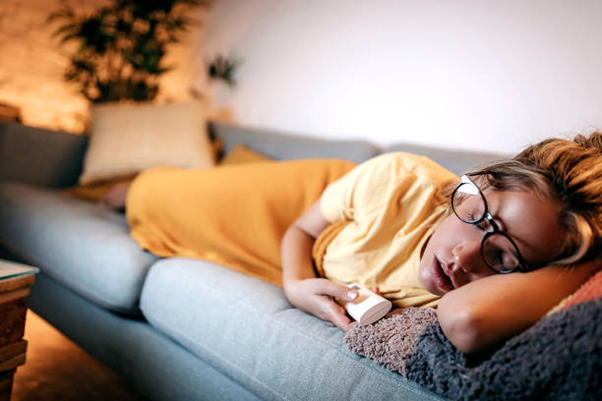Sleep is an integral part of our body that recalibrates our body, assisting it to work the next day. Therefore it is important that we focus on how we can sleep better and what we can do to engage more in deep sleep.
We all want a good night’s sleep, but what is deep sleep, and how much deep sleep do you need? Babies and children spend more time in REM than adults. While children spend half of their sleep in REM, adults spend only 20 to 25 percent of their time in this stage, or about two hours. To enter deep sleep, people must first experience a series of lighter stages. Many doctors recommend that you sleep for at least 7 hours per night, which allows your body to complete several sleep cycles. While you are sleeping, you will be maintaining your physical and mental health and helping your brain to make new memories.
Table of Contents
REM Sleep
The stages of sleep are divided into three categories: REM, Deep Sleep, and Stages of Rest. REM sleep is very different from other stages. It paralyzes the muscles and the eyes, while the brain continues to work. REM sleep is associated with vivid dreams and can last as long as an hour. This type of sleep is essential for memory consolidation and learning, and it’s important for your brain to get the correct amount of REM sleep for its proper functioning.
Your brain undergoes several changes during this sleep. Your heartbeat and breathing rate slow, while the brain repairs itself. REM sleep is the most dream-producing stage, generating more memories and thoughts than any other stage of sleep. It’s possible to dream while you’re in this stage, but it can be difficult to wake up once you’re in this state. It can even result in a mental fog for an hour after awakening.
It may sound counterintuitive, but exercise can improve your sleep quality. Increasing your physical activity every day will improve your REM sleep. Try walking for at least 20 minutes per day, but if you can’t do that, you can try incorporating other physical activities into your daily routine. Try to do any light to moderate physical activity at least three hours before you go to sleep. REM sleep is essential for energy levels, so making sure you get enough restful sleep is essential to a healthy lifestyle.
Deep Sleep
If you have trouble falling asleep, you may not be getting enough deep sleep. Deep sleep is also known as delta sleep and slow-wave sleep. If you wake up frequently in the middle of the night, or if you fall below seven to nine hours, you may not be getting enough deep sleep. There are several ways to get more deep sleep, including practicing proper sleep hygiene. Follow these tips to get a better night’s sleep.
When you are sleeping, the brain prepares your synapses for the next day. During deep sleep, your brain consolidates the most recent memories, evaluates new experiences, and preserves the best ones. Good sleep improves your ability to learn and adapt to a new environment. For this reason, it is important to get enough deep sleep. But even if you are able to sleep for a long time, don’t overdo it.
While a good sleep schedule can help you feel rested and energetic during the day, it is crucial that you get enough deep sleep to stay healthy. Deep sleep is the most beneficial part of the sleep cycle. It’s when your body begins to repair itself. As you can imagine, the first third of your sleep cycle is spent in deep sleep. Children and teens need more time in deep sleep than adults. While adults need twenty to thirty minutes of deep sleep, children and adolescents need only sixteen to twenty percent of their nighttime.
The Correlation between REM sleep and Deep Sleep
The REM cycle and Deep Sleep are correlated to the same physiological state, but there are some subtle differences. REM sleep occurs during a short period of time, usually less than fifteen seconds. During this time, the body responds to signals from the brain called REM indicators. These signals are produced by devices that can stimulate the brain. But, in some cases, the signals can be too stimulating for the person to fall into REM sleep.
A third mechanism to control the REM cycle is the use of lucid stimuli. This involves using an electronic device to evoke the REM stages of a dream. This device is called the REM-Stimulus Generator, and it produces colored lights for the user’s ocular senses. These colored lights may include red, green, and blue full-spectrum lights. The term “different colored light” refers to any other color that the user’s eyes can detect.
Things That Would Induce Deep Sleep
● Pink noise
Although white noise has long been the solution for drowning out the sound of a noisy room, recent studies have shown that pink sounds may actually help you get a better night’s sleep. Lack of sleep has many negative effects, including weight gain, increased risk for heart disease, and higher blood pressure. Research shows that listening to pink noise can help you fall asleep faster and sleep deeper. Listed below are the benefits of pink noise for deep sleep.
One study from 2020 showed that listening to pink noise helped participants fall asleep more quickly and stay asleep for longer. It also improved work efficiency, continuous performance, and working memory, among other things. But the study was small, with only a few participants, so larger studies are needed to prove the clinical benefits of pink noise. Until larger research is conducted, it’s probably best to give pink noise a try yourself and see if it helps you sleep better at night.
Even your sleeping position matters in the amount of sleep that you would receive. There are different types of sleeping positions but you must select the one that induces better sleep.
● Binaural Beats
Studies show that binaural beats have the power to induce deep sleep. These brainwave tones are known to stimulate brainwave entrainment, which is a process where the brain aligns its intrinsic frequency with a sound wave that creates a stimulus. The brainwaves that are active during deep sleep are called delta waves, which have slower frequencies than alpha and beta waves. The brain responds to these tones differently, which may be why binaural beats can induce a deeper sleep.
First, you should find an audio file containing binaural beats. These can be found on the Internet and downloaded to an MP3 player. For best results, look for one that has frequencies between 0 and 7 Hz, which are commonly associated with REM sleep. Studies have shown that these beats help people experience a deep sleep and reduce anxiety. You should also listen to binaural beats between 4 and 8 Hz.
Adjusting Sleeping Environment
The bed and its surroundings are crucial factors in deep sleep. One-third of a human’s day is spent in bed, and many people use synthetic mattresses sprayed with stain and flame-retardant chemicals. As a result, sleeping on these mattresses exposes people to harmful chemicals. Luckily, there are many simple tips to make your bedroom a more peaceful place to sleep. Here are just a few of them.
Your bedroom should be cool, dark, and quiet to ensure deep sleep. Try to avoid anything that may distract you. Temperature is also an important factor. If you’re prone to night sweats, your bedroom should be at a comfortable temperature of 65 degrees Fahrenheit or higher. This is the most conducive temperature for deep sleep. You may even want to adjust the lighting in your room, as well. But remember that it’s your bedroom, not your neighbor’s.
Conclusion
Finally, while concluding it can actually be argued that Deep Sleep is an integral part of sleep and without it, many essential functions would cease to exist. Therefore the article essays on the importance of deep sleep and ways to continue it hindered. Happy Sleeping…


